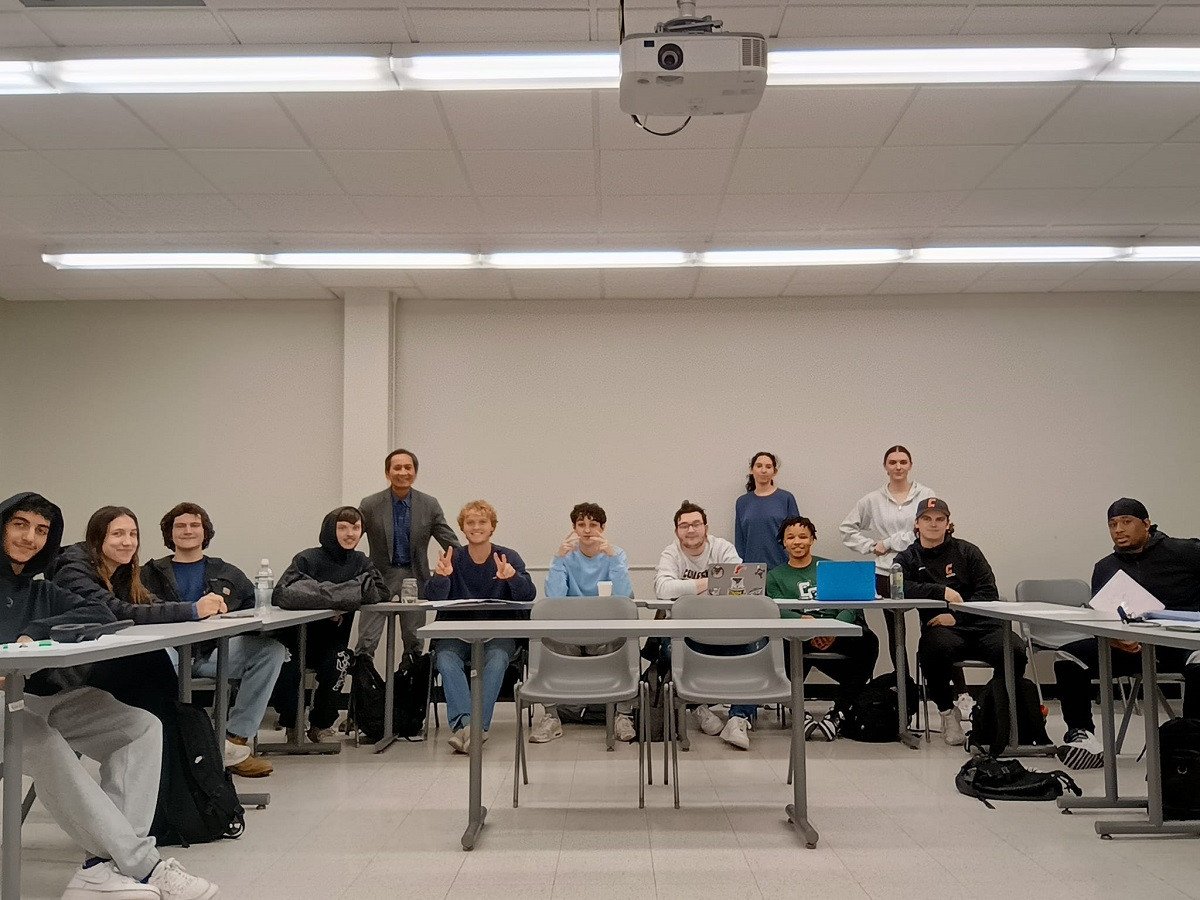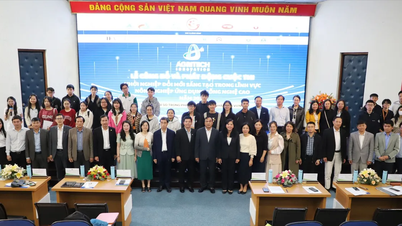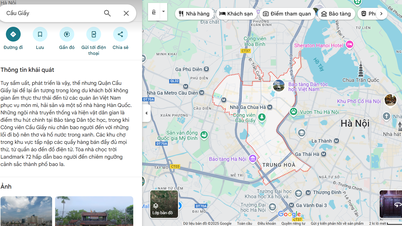Professor Tran Luong Son, Director of the Startup Program at SUNY Cobleskill - New York University (USA) - shared with VietNamNet reporters a lot of interesting information about the similarities and differences in training and incubation activities for startups in the US compared to Vietnam, and at the same time gave some recommendations so that Vietnamese technology startups can reach international standards.
Start a business to have a prosperous life to help the community
- As the Director of the Entrepreneurship Program at New York University - SUNY Cobleskill, what makes you feel most proud, sir?
Professor Tran Luong Son: When I received the recruitment decision to take on the position of director of the startup program at an American university, my joy at being lucky was probably greater than my pride.
I have been teaching entrepreneurship in Vietnam since 2011, considering it a social contribution rather than a business. When my family immigrated to the US in 2021, I still wanted to do this job, with a certain confidence. But it turned out that things were not as easy as I thought.
According to the regulations in highereducation in the US, to teach in a certain field, you must have a doctorate in that field. For example, to teach entrepreneurship , you need a doctorate in entrepreneurship.
Mr. Tran Luong Son, Director of the Entrepreneurship Program at SUNY Cobleskill - New York University (USA). Photo: Provided by the character
However, fortunately, academic due to a severe shortage of qualified staff, universities in the US in the past 10 years have recruited non-academics to teach entrepreneurship and awarded them a special title - Professor of Practice ( Professor of Practice , or Clinical Professor ).
In the US, there are many famous practice professors in the startup world. Typically, Massachusetts Institute of Technology (MIT) has Professor Bill Aulet - one of the first practice professors on startups in the US; Stanford University has Professor Steve Blank.
They are both very successful entrepreneurs and venture capitalists. Both professors have famous books in the US and around the world about entrepreneurship, such as The Startup Bible (Bill Aulet), Four Steps to the Top (Steve Blank) are the top books about entrepreneurship that I recommend and have both been translated into Vietnamese.
There are many good Vietnamese professors in the US, but it seems rare to find Vietnamese professors teaching about startups in the US. I am looking for them to collaborate with.
SUNY Cobleskill launches an entrepreneurship program in 2023, looking for someone with both entrepreneurial and teaching experience to lead the program. I was lucky to be selected. The burden of administrative and teaching responsibilities was real since I had only known the American university environment as a student, not a teacher. I learned a lot during that time.
- What is your impression of students in the US participating in startup training programs?
America is known as a “startup nation,” but the spirit, tone, and environment of entrepreneurship vary from state to state. In rural New York State, where I work, many young people think of entrepreneurship as something far away, out of reach, very different from New York City, a symbol of American entrepreneurial success, not far away.
However, there are many types of startups. Opening a small store, creating a new product to consume in the local community is also a startup, not necessarily a high-tech company with miraculous growth.
After participating in our curriculum, many students have realized: It turns out that starting a business is not so difficult. There is an element of luck, but understanding will help you get lucky more easily.
I helped my students understand that entrepreneurship requires learning, and that learning can be done. Learning entrepreneurship can be very difficult, like many programs at top universities in the US, but it can also be not so difficult, like the “7 Steps to Entrepreneurship” curriculum that I brought to the school.
The purpose is to make it easy for learners with no background in business to absorb and apply. This course has been adopted and perfected at SUNY Cobleskill to teach not only students but also small business owners in the area.
SUNY Cobleskill University to launch entrepreneurship program in 2023. Photo: Character provided
The good news is that the program has many very smart students who grasp knowledge very quickly, and within just 1-2 months they can build a basic business project to participate in regional and state startup competitions. Many students have surprised me with their creativity and boldness in business ideas.
- Are there many successful businessmen among your students in the US?
My school's startup program is only a year old. We haven't had enough time to have any significant success stories from our students and trainees. However, we have seen clear prospects from the confidence and enthusiasm of all members after each course.
My student body includes both students and local business people. During the day I teach students and in the evenings I usually teach business people, including small business owners over the age of 40.
I always keep in mind, share with my students and get enthusiastic reception of the philosophy that starting a business is not to become very rich, but to have a comfortable and happy life, with meaningful contributions to the development of the local community - something I especially discovered in rural New York state.
Incubating tech startups: What can Vietnam learn from the US?
- What is special about technology startup incubation training activities in the US?
Entrepreneurship is a very broad concept, including both non-technological startups (such as opening a restaurant, bakery, selling food...), and technological startups (creating products and services with high scientific and technical content, innovative breakthroughs based on technology), but both need and should apply a general foundation of knowledge about entrepreneurship.
Startup support centers in Silicon Valley, Texas,... or major schools like MIT, Stanford, Harvard all have such program frameworks.
However, the academic and professional university training streams of MIT, Stanford, Harvard... tend to teach how to build business plans and basic knowledge for startups such as marketing, sales, human resource management, while the training streams outside the academic environment such as Silicon Valley, Texas... focus on creative models, technology-based business, methods of creating new breakthrough products as well as methods of commercializing products.
American universities have been promoting entrepreneurship training in the past 10 years. Photo: Character provided
With its distinct culture and business environment, Vietnam can learn from the US what is appropriate for any form of startup, from small, local startups to high-tech, international startups.
Over the past 10 years, American universities have simultaneously promoted entrepreneurship training and built student entrepreneurship support centers, such as SUNY Cobleskill - the first to build the "Steps for Success Entrepreneurship" program, which I was assigned to lead.
I also had the opportunity to work as an entrepreneurial advisor for the University of Maryland, where the federal government funded projects to commercialize the scientific research results of professors and doctoral students. These projects do not direct scientists to become entrepreneurs, but connect them with entrepreneurs outside the academic environment to co-start businesses, while they can still continue their research. Their customers are organizations with a very high demand for new, breakthrough technologies such as the Department of Defense, the Department of Transportation, the Department of Health, the National Aeronautics and Space Administration NASA, etc.
- What about startup training activities in Vietnam?
Vietnam also has both startup training streams like the US, but both have certain limitations.
During my time in Vietnam, I participated in training and supporting student startups and commercializing the research results of scientists. However, it can be seen that many universities and startup support centers in Vietnam are still confused about the orientation of the program and the content of startup training.
Some very successful entrepreneurs who are invited to teach startups do not have basic knowledge of business administration, only share successful lessons in their specific fields, lack a broader perspective with general knowledge, leading to subjective and ineffective knowledge transfer.
In my experience, entrepreneurship education needs to combine both fundamental business knowledge from academic experts with real-world business experience from experienced entrepreneurs. That is the problem that even the United States is facing.
- Does the US government have any mechanisms, policies, or models to support startups?
I was surprised to see that in the US, small businesses and startups are given very generous incentives by the government from federal to state.
America has many excellent professors, experts, and researchers. In principle, all R&D products must be commercialized to bring value to the market. But good professors and researchers are not to step out of the academic environment to start a business.
The US government has a support program through connecting them with businesses and entrepreneurs outside the research environment, forming teams that the state provides non-refundable funding to bring to market scientific research products of professors and research experts in universities. The US government has spent a lot of money on the above activities, estimated at tens of billions of USD each year, through the National Science Foundation (NSF).
On the other hand, the state budget is also put into universities to pay professors who teach startups. When startup teams have projects with the participation of professors, they will be directly funded by the state budget without participating in equity ownership.
In this way, the Government helps create new startups. The value and benefits that the Government gets will be their success and the tax money that the company will pay to the budget in the future.
- Can Vietnam learn and apply the US way of doing things?
Vietnam has implemented a very large-scale national startup project. In reality, the state budget allocated to startups is very limited, mainly focusing on startup support centers, while the support of these centers has not been as effective as expected.
I think Vietnam needs to learn more from the US, both in the university environment and the market in general. With the state's non-refundable funding, balance the investment in both the startup support center and the startups themselves; create incentives for startups support centers to develop more successful startups.
Mr. Son and students in the US. Photo: Provided by the character
Vietnamese tech startups should not “reinvent the wheel”
- What are the difficulties and obstacles for technology startups in Vietnam today?
Technical knowledge in the industry you intend to start a business in is a very important start, but I believe that basic knowledge of business, entrepreneurship and execution capacity are the deciding factors.
Many young Vietnamese people who have just graduated from school lack business knowledge but are still eager to start a business, unable to visualize the overall picture of business, unaware of the difficulties and obstacles that lie ahead, thus wasting money, opportunities, and youth.
The Vietnamese startup ecosystem is not ready to support breakthrough startup ideas and groups.
Vietnamese technology startups do not have many advantages to penetrate the global market when Vietnam's reputation and technological competitiveness still need to continue to improve a lot.
- To reach the international market, what do Vietnamese technology startups need to do?
To start a successful business, you need to find and solve the right market problem and create new value for customers.
Vietnamese technology startups need to learn how to monitor market fluctuations, need to know what the world has and is having to create new breakthrough products, not "reinvent the wheel".
Technological advances, including market disruptions, are constant. The global technology market is flat and changing every day. If you want to reach out to the international market, you must first establish your position in the domestic market because Vietnam, with a population of one hundred million, is a very large market that many businesses want to have.
Along with that, you need to be fluent in foreign languages and international business practices.
If you want to expand into the international market, you should build your company as an international company from the very beginning. That was my lesson when I started my first company, VietSoftware, in 2000 - our written language and written communication was English.
In particular, technology startups should try to gain experience, gain exposure to the international technology environment, find ways to collaborate with global teams, and choose business partners in developed countries to go the long way together.
Young Vietnamese people have a lot of ideas, energy and dreams. However, the journey from there to reality is a long one, and it is difficult to avoid failures, big and small. But that's okay, failure is also a valuable asset, which needs to be cherished and utilized.
I always highly appreciate the entrepreneurial spirit of Vietnamese people, especially the current young generation: enthusiastic about taking risks, eager to experience, full of dreams and thirst for success. You guys, we are very deserving of success in the international market.
Every time I talk about Vietnamese startups, I remember Professor Simon Johnson, who just won the 2024 Nobel Prize in Economics, who taught us about startups at MIT. In 1999, he said: Vietnam is one of the countries with the highest entrepreneurial spirit in the world. Do we have an extremely important asset that the world recognizes?
Thank you!
Source: https://vietnamnet.vn/Giao-su-day-khoi-nghiep-o-my-mach-nuoc-startup-viet-cach-vuon-tam-quoc-te-2367027.html










































































































Comment (0)